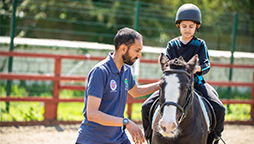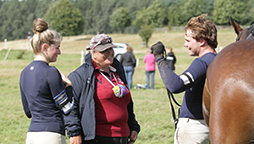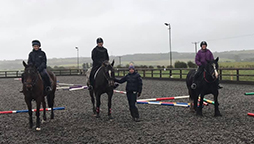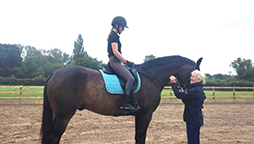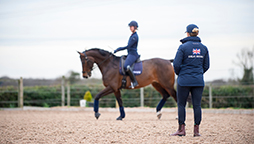Coaching competitive adults
While some coaches will specialise in working with one particular participant group, others will work across several different groups over the course of their coaching. The coaches featured on this page are just some of those who are working with adult competitive riders who focus on being competitive against others. These riders will train with the aim of competing successfully and moving up the levels.
Quick jump to a coach's profile
Ali Dane
Alison Kenward
Phil Kinsella
Anthony Lane
Kim Tinkler
Ali Dane.jpeg)
What are your coaching qualifications?
BDCC 2 and BDCC 3
WHAT ARE THE MAIN PARTICIPANT GROUPS THAT YOU COACH?
- Riders up to the age of 12 of all abilities
- Teenagers of all abilities
- Adult participation riders
- Adult competition riders
If you teach multiple participant groups, do you have a favourite?
No specific favourite, I enjoy teaching anyone who is open to learning and loves horses!
What inspired you to start coaching?
Initially it was my the love of horses, but I soon realised that I like meeting new people and developing professional relationships with my riders. Being part of their equestrian journey is a privilege, which is what drives me to go out and coach all day, every day.
What's your proudest coaching moment?
I have a new one every week! It could be anything from my special needs teenagers finally finding the rhythm for rising trot, to my Pony Club teams being successful at Grassroots and Areas, or clients being placed at BD Regionals and Nationals – they all make me extremely proud.
How would you encapsulate your approach to coaching?
By putting the horse and rider first, I aim to help each partnership to develop through empowerment, patience and an open-minded approach to training. It’s their journey, not mine – I’m just very lucky to be taken along for the metaphorical ride!
Have you had to adapt your coaching over the past six months? Do you think it's made you a better coach?
During lockdown, I did a lot of video feedback for riders, which many have continued with. This has made me more aware of how riders train at home, which often differs hugely from what we do during lessons! I feel like it has made me more empathetic to the issues that riders face when not being coached.
Do you have a piece of coaching wisdom that you feel most riders could benefit from?
Enjoy it! Be careful of putting so much pressure on yourself that you no longer look forward to getting on your horse.
What advice do you have for somebody looking for a coach to learn from?
Firstly, please look for qualifications and insurance. If a coach has these, then look at their competitive achievements if that’s what matters to you. Find out what friends who are at a similar level to you think of their own coach, but remember that what works for one person might not work for you, and vice versa.
Don’t be afraid to ask lots of questions, and be honest with any and all information you give the coach. You should finish your lesson feeling empowered, enthused and excited to learn more. The coach should make you feel at ease and should be interested in you and your learning journey, and not use your lesson as an opportunity to reel off their achievements. You want someone who will listen to you and try to tap into how you best learn.
If, for whatever reason, it doesn’t work with a coach, don’t be afraid to walk away. We’re very resilient and know that we’re not going to click with everyone. However, please do try and discuss it with us – if there’s something we can do better, we’d (usually!) like to know about it.
Alison Kenward
What are your coaching qualifications?
BHS APC Stable Manager and Senior Coach, UKCC Level 3, Centre10 Advanced Coach, British Dressage Recognised Coach and List 6 Judge, NDPCE
WHAT ARE THE MAIN PARTICIPANT GROUPS THAT YOU COACH?
- Adult participation riders
- Adult competitive riders
DO YOU HAVE A SPECIALTY or a favourite aspect of coaching?
I specialise in working with riders to develop their mental skills alongside learning how to control their emotional state, so that they're able to ride with empathy and effectiveness, and enjoyment at home and in competition.
What inspired you to start coaching?
I was demonstrating how to play polocrosse at a Pony Club Junior Camp and stayed behind to help teach the younger members. I was invited to train to be a Coach at Greenacres Riding School in 1993.
What’s your proudest coaching moment?
This year I'm proud of responding to lockdown by creating a free equestrian athlete discussion group on Zoom on a Monday night. We have a great mix of novice horse owners who are just starting in competition, all the way up to those competing at Premier League dressage, or Advanced eventing and showjumping, plus some coaches and judges, too. We are joined by Tiny Clapham and Richard Baldwin and more than four elite coaches. Riders still join in from around the country every week, and we also have a supportive Facebook Messenger group.
How would you encapsulate your approach to coaching?
I enjoy developing a horse and rider's partnership, where the horse always comes first and the rider is recognised as a person as well as an athlete. We work to achieve this as a team.
Have you had to adapt your coaching over the past six months? Do you think it's has made you a better coach?
I've learnt to embrace technology and connect with people in a very challenging time. Now that I'm able to meet up with the riders as we begin to move away from lockdown, I've found that our relationships are stronger and this has enhanced my 'person/horse first' approach.
What advice do you have for somebody looking for a coach to learn from?
Reach out to that person in a message or with a phone call. By having a conversation, you'll be able to find out if they can help you to achieve your goals. Attending clinics or watching when safe to do so is a great way to get to learn more about a coaches’s approach.
Phil Kinsella
What are your coaching qualifications?
UKCC Level 4 (British Horseracing Association), member of the Jockey Coaching Programme
WHAT ARE THE MAIN PARTICIPANT GROUPS THAT YOU COACH?
Adult competitive riders
DO YOU HAVE A SPECIALTY or a favourite aspect of coaching?
I enjoy working with inexperienced jockeys, discussing process and theory with them and building their confidence.
What inspired you to start coaching?
I've always enjoyed helping people and giving them advice with things I found helped with my own career in the saddle.
What’s your proudest coaching moment?
I'm always proud when any of the jockeys I've coached ride winners, and ride their claim out. I know how hard the jockeys work and how much it means to them, so I’m proud that I’m able to coach them and help achieve their goals.
How would you encapsulate your approach to coaching?
Creating a fun, safe and secure environment where jockeys feel safe to ask questions, learn and improve.
Have you had to adapt your coaching over the past six months? Do you think it's has made you a better coach?
I’ve found I’ve had to make more use of remote coaching tools such as phone calls, and being more readily available to jockeys should they need me
Do you have a piece of coaching wisdom that you feel most riders could benefit from?
Keep things simple and minimize the uncontrollable as much as possible. Be sure to listen to instruction where it is given.
What advice do you have for somebody looking for a coach to learn from?
Every single coach has something to offer, and has ways of working that you can learn from no matter what their background or their sporting discipline is. Be open to learning and accept constructive criticism.
Anthony Lane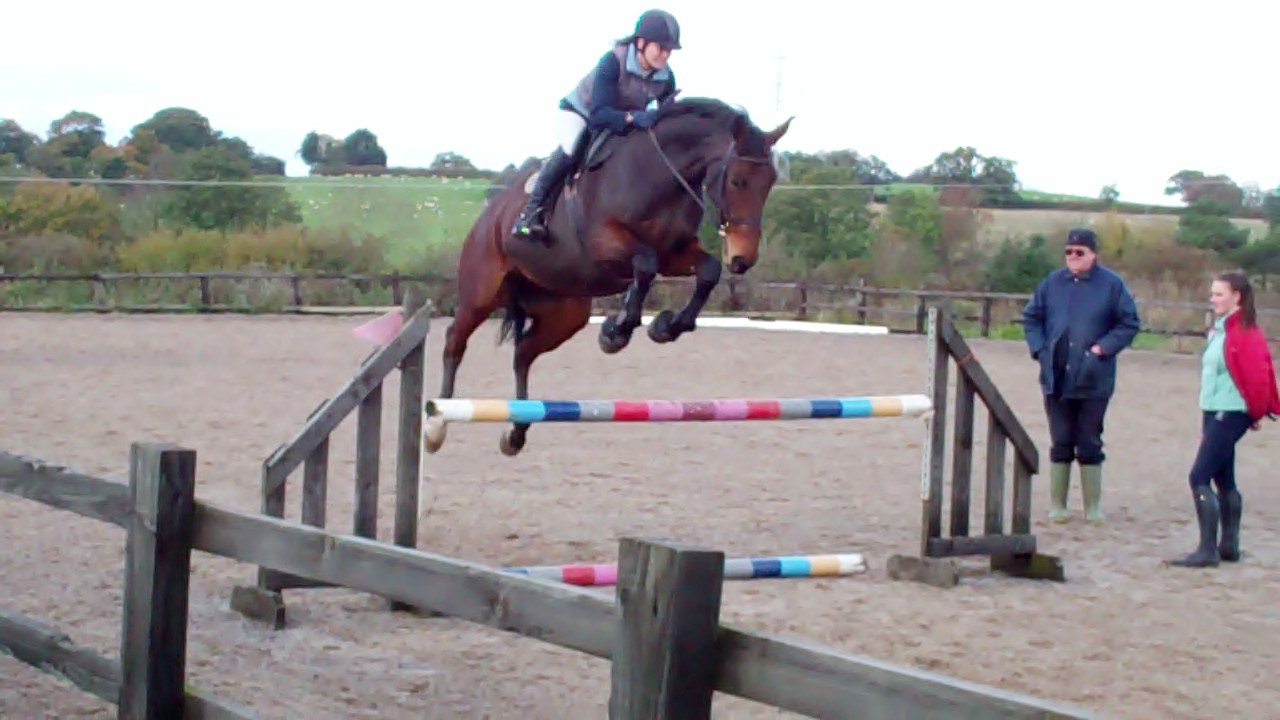
What are your coaching qualifications?
BHS ACP, British Showjumping Coach, UKCC Level 3 (British Showjumping), Centre 10 Advanced Coach
WHAT ARE THE MAIN PARTICIPANT GROUPS THAT YOU COACH?
- Teenagers of all abilities
- Adult competitive riders
- Performance development riders
If you teach multiple participant groups, do you have a favourite?
The majority of my sessions are with competitive riders, but I'm willing to coach any horse and rider who wants to improve.
What inspired you to start coaching?
My love of horses. I'd been riding for about a year and used to work at the local riding school at the weekend in exchange for riding lessons. I was watching a lesson there and observed how strong and rough some clients were with the horses while riding, due to the fact that they knew no better. I realised that the riders' lack of education in effective riding skills was the reason that some of the horses were in such discomfort. This is what inspired me to learn to ride effectively with feel, and then to become a coach with the ability to pass that knowledge on to others so they in turn can become accomplished riders.
What’s your proudest coaching moment?
I take great pride when my horses and riders enjoy their training sessions. What I find particularly satisfying is when a rider achieves a goal due to making their own decisions as a result of our coaching sessions, which have developed their understanding of correct training to enable them to have the confidence to make these key decisions.
How would you encapsulate your approach to coaching?
My aim is to produce coaching sessions that are tailored to suit the individual, from the most nervous beginner to the most ambitious competition rider. One of my objectives when coaching is to create a learning experience where riders can develop confidence and improve their riding skills, and become as passionate about correct training as I am! My coaching is based on the scales of training, while paying attention to the biomechanics of horse and rider to enhance performance. I pride myself in helping nervous riders overcome their inhibitions and begin to enjoy their horse.
Do you have a piece of coaching wisdom that you feel most riders could benefit from?
Keep training simple, be effective and enjoy your horse. Always remember: 'from true understanding comes simplicity'.
What advice do you have for somebody looking for a coach to learn from?
- Is the coach insured?
- Do you enjoy the coaching sessions?
- Do they motivate you?
- Are they willing to pass on their experience in a manner that you can understand and relate to?
- Are their observations constructive?
- Have they enough experience to guide your progress and help you to achieve your goals?
- And finally: Do they love horses?
Kim Tinkler
What are your coaching qualifications?
UKCC Level 3 (British Horseracing Association), member of the Jockey Coaching Programme
WHAT ARE THE MAIN PARTICIPANT GROUPS THAT YOU COACH?
Adult competitive riders
DO YOU HAVE A SPECIALTY or a favourite aspect of coaching?
I work with apprentice and conditional jockeys, and I love their sporting and competitive attitude and drive.
What inspired you to start coaching?
I get a buzz from seeing young jockeys in the developmental stage of their career go through the various stages of improvement through coaching.
What’s your proudest coaching moment?
Coaching two jockeys to win the Richard Davis Award.
How would you encapsulate your approach to coaching?
I truly believe you should lead by example, and try to inspire your athletes to be the best they can be.
Have you had to adapt your coaching over the past six months? Do you think it's has made you a better coach?
I've made an effort to check in with my jockeys more over the phone when I haven’t been able to see them in person due to the restrictive times we are in. As a coach, it's as important to be a sounding board as technically corrective at this time, and adapting to this method has helped me do that.
Do you have a piece of coaching wisdom that you feel most riders could benefit from?
Don’t give up when you feel like doing so, and push through those walls of limitations.
What advice do you have for somebody looking for a coach to learn from?
A coach you can have a productive and cooperative working relationship with is paramount in order to be successful.
